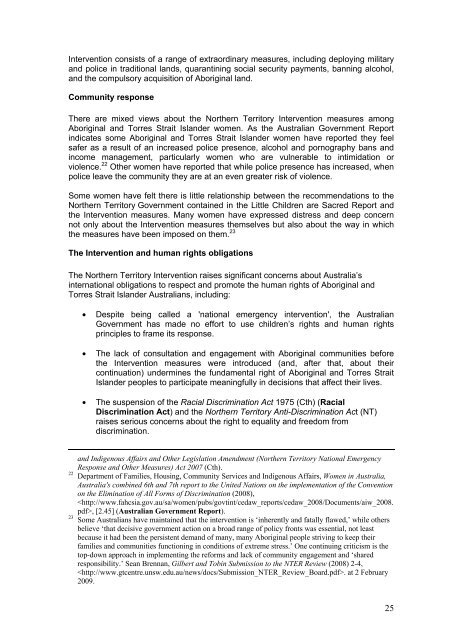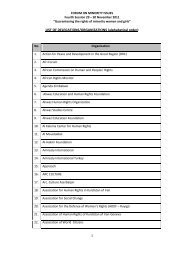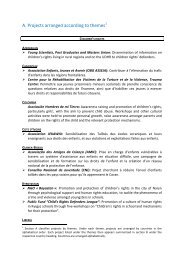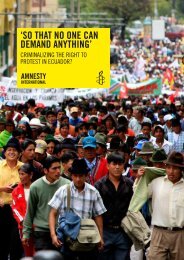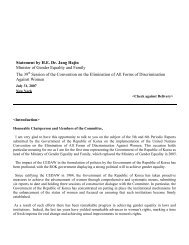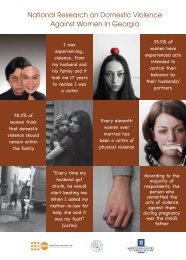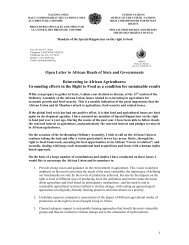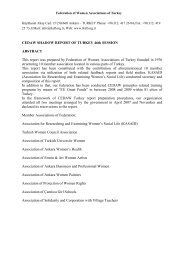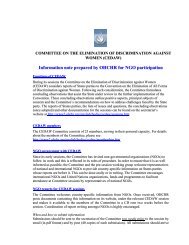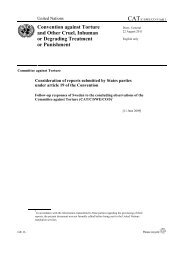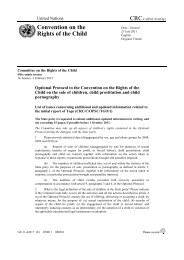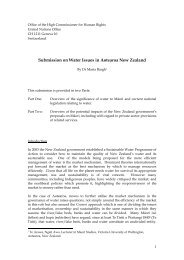Australian Aboriginal and Torres Strait Islander Women's Parallel ...
Australian Aboriginal and Torres Strait Islander Women's Parallel ...
Australian Aboriginal and Torres Strait Islander Women's Parallel ...
You also want an ePaper? Increase the reach of your titles
YUMPU automatically turns print PDFs into web optimized ePapers that Google loves.
Intervention consists of a range of extraordinary measures, including deploying military<strong>and</strong> police in traditional l<strong>and</strong>s, quarantining social security payments, banning alcohol,<strong>and</strong> the compulsory acquisition of <strong>Aboriginal</strong> l<strong>and</strong>.Community responseThere are mixed views about the Northern Territory Intervention measures among<strong>Aboriginal</strong> <strong>and</strong> <strong>Torres</strong> <strong>Strait</strong> Isl<strong>and</strong>er women. As the <strong>Australian</strong> Government Reportindicates some <strong>Aboriginal</strong> <strong>and</strong> <strong>Torres</strong> <strong>Strait</strong> Isl<strong>and</strong>er women have reported they feelsafer as a result of an increased police presence, alcohol <strong>and</strong> pornography bans <strong>and</strong>income management, particularly women who are vulnerable to intimidation orviolence. 22 Other women have reported that while police presence has increased, whenpolice leave the community they are at an even greater risk of violence.Some women have felt there is little relationship between the recommendations to theNorthern Territory Government contained in the Little Children are Sacred Report <strong>and</strong>the Intervention measures. Many women have expressed distress <strong>and</strong> deep concernnot only about the Intervention measures themselves but also about the way in whichthe measures have been imposed on them. 23The Intervention <strong>and</strong> human rights obligationsThe Northern Territory Intervention raises significant concerns about Australia’sinternational obligations to respect <strong>and</strong> promote the human rights of <strong>Aboriginal</strong> <strong>and</strong><strong>Torres</strong> <strong>Strait</strong> Isl<strong>and</strong>er <strong>Australian</strong>s, including:• Despite being called a 'national emergency intervention', the <strong>Australian</strong>Government has made no effort to use children’s rights <strong>and</strong> human rightsprinciples to frame its response.• The lack of consultation <strong>and</strong> engagement with <strong>Aboriginal</strong> communities beforethe Intervention measures were introduced (<strong>and</strong>, after that, about theircontinuation) undermines the fundamental right of <strong>Aboriginal</strong> <strong>and</strong> <strong>Torres</strong> <strong>Strait</strong>Isl<strong>and</strong>er peoples to participate meaningfully in decisions that affect their lives.• The suspension of the Racial Discrimination Act 1975 (Cth) (RacialDiscrimination Act) <strong>and</strong> the Northern Territory Anti-Discrimination Act (NT)raises serious concerns about the right to equality <strong>and</strong> freedom fromdiscrimination.<strong>and</strong> Indigenous Affairs <strong>and</strong> Other Legislation Amendment (Northern Territory National EmergencyResponse <strong>and</strong> Other Measures) Act 2007 (Cth).22 Department of Families, Housing, Community Services <strong>and</strong> Indigenous Affairs, Women in Australia,Australia's combined 6th <strong>and</strong> 7th report to the United Nations on the implementation of the Conventionon the Elimination of All Forms of Discrimination (2008),, [2.45] (<strong>Australian</strong> Government Report).23 Some <strong>Australian</strong>s have maintained that the intervention is ‘inherently <strong>and</strong> fatally flawed,’ while othersbelieve ‘that decisive government action on a broad range of policy fronts was essential, not leastbecause it had been the persistent dem<strong>and</strong> of many, many <strong>Aboriginal</strong> people striving to keep theirfamilies <strong>and</strong> communities functioning in conditions of extreme stress.’ One continuing criticism is thetop-down approach in implementing the reforms <strong>and</strong> lack of community engagement <strong>and</strong> ‘sharedresponsibility.’ Sean Brennan, Gilbert <strong>and</strong> Tobin Submission to the NTER Review (2008) 2-4,. at 2 February2009.25


